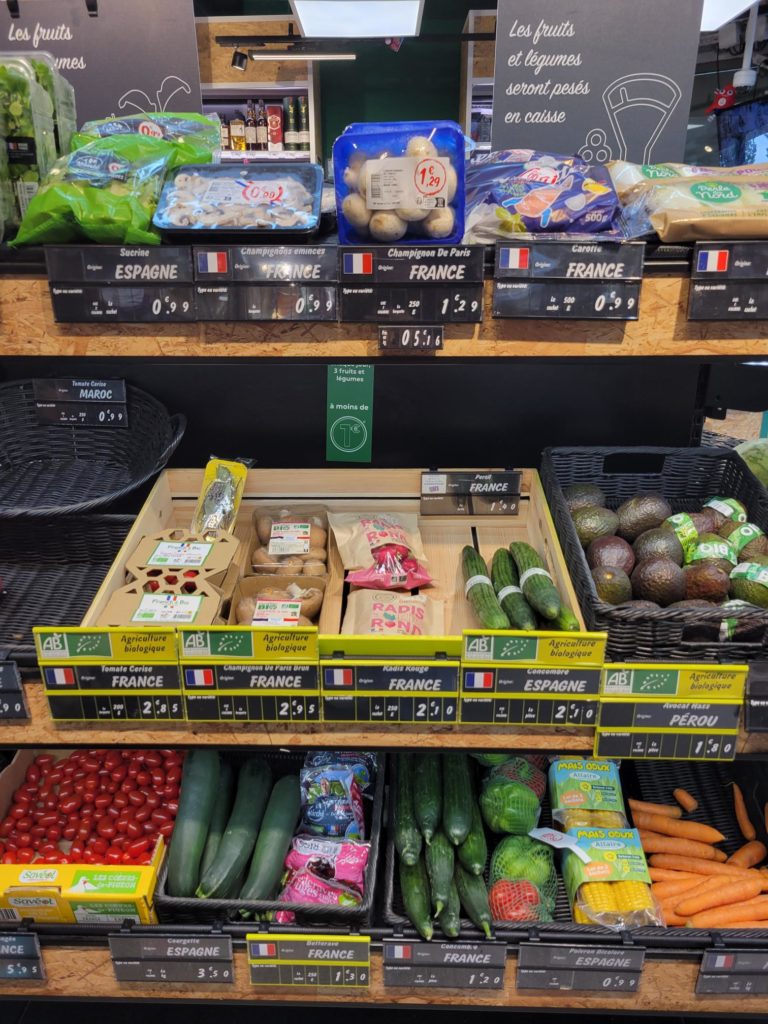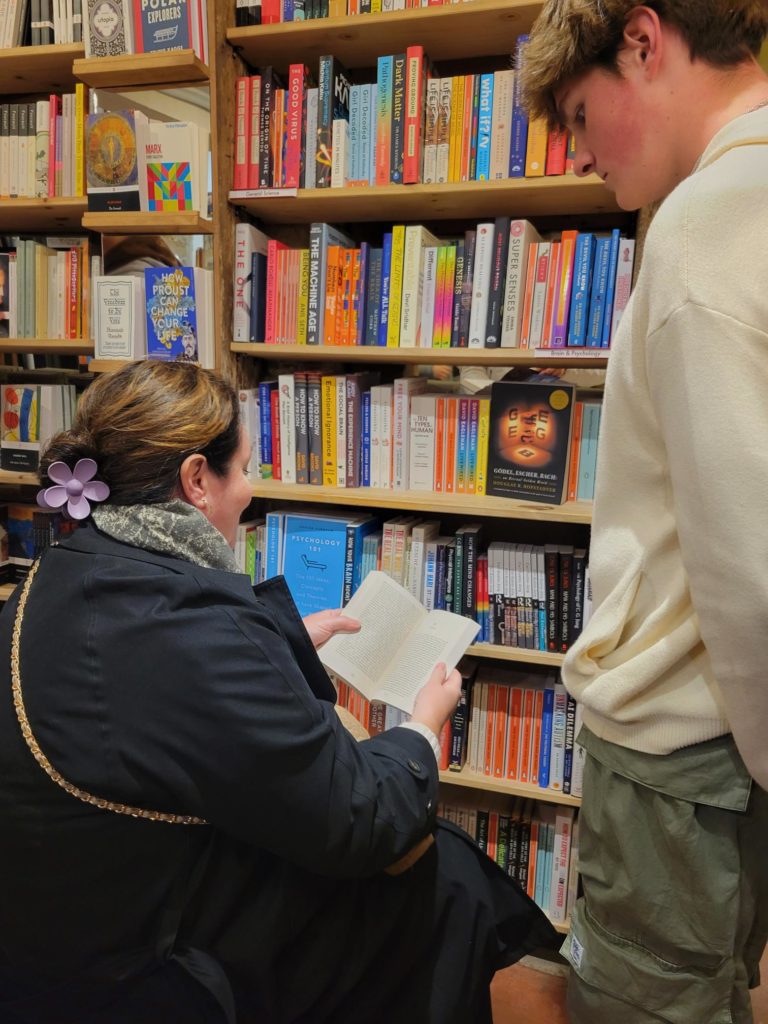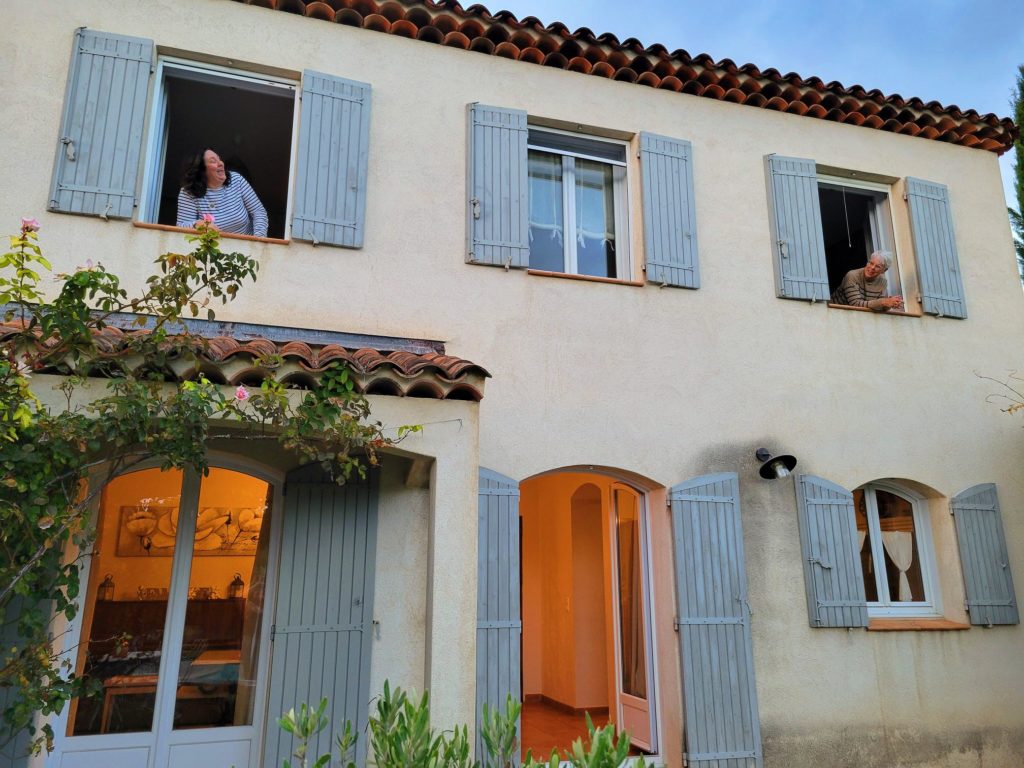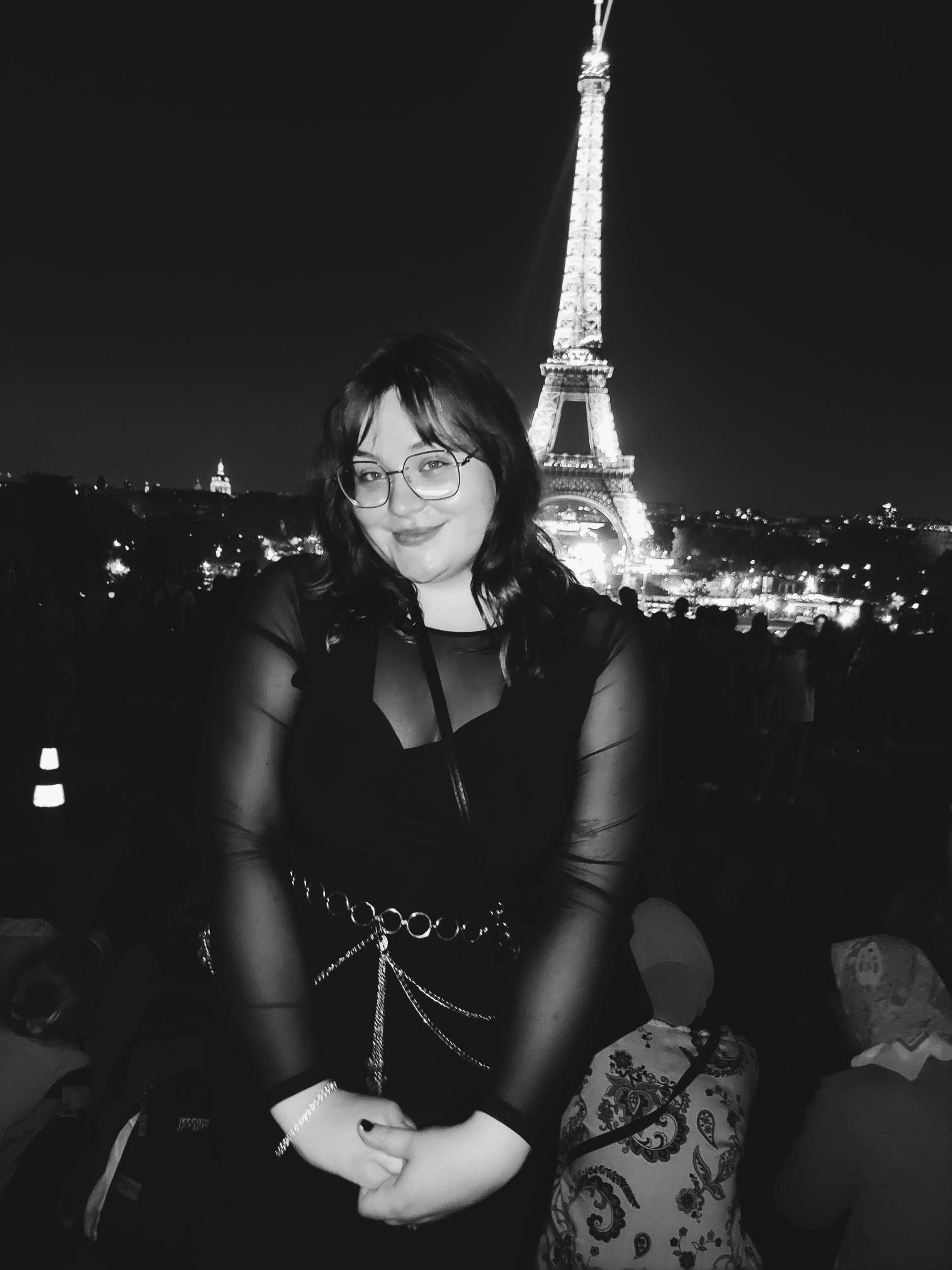The first thing I learned during my semester abroad was how to use an induction stove. It was a couple days after the FlixBus had dropped my partner and I off in Tours, and we had been living off of microwave meals, pasta salads, and bags of Emmental flavor chips from the Charles de Gaulle Monop’. Our sleep patterns had been erratic as we attempted to adjust to the time change. Those first two weeks, we didn’t fall asleep until five or six a.m. most nights, waking up as late as 4 p.m. in the worst cases. I was also in a difficult emotional state after a tearful goodbye with my mom and little brother at O’Hare, and an even more tearful goodbye with my cats after dropping them off at my mother’s house the morning my partner, Molly, and I left. Suffice it to say, it was time for a home-cooked meal.
We dragged ourselves out of the Airbnb and to the closest Carrefour in walking distance. The grocery store was an array of thrilling color, the warm smell of produce, and the crinkling sounds of plastic packages. We filled our tote bags with vine-ripened tomatoes, garlic from Spain, and a packet of miniature elbow noodles called coquilettes. It was our first real sense of immersion, this grocery store, the psychic data that Don DeLillo describes in White Noise swarming around us, buzzing in another language. I felt inspired.

We hauled the groceries back to the place we would grow to call home over the next three months, and I discovered my first obstacle: the glass pane with three different-sized circles, and a row of tiny circles with unfamiliar symbols and empty rectangles in the bottom-right corner.
The circles couldn’t have been buttons, could they? I pushed each one and nothing happened. I pushed the squares, still nothing. The knobs below were for the oven, another puzzle for later. I held my finger down on one of the circles, and suddenly a bright red L appeared in each of the three rectangles. Progress! But after three seconds, they disappeared.
Two YouTube tutorials later, I discovered that the Ls meant Locked, and that I had to hold down the circle with the little key symbol to unlock the stove. I also learned that induction stoves are only compatible with induction cookware, and that the strange, flat, metal pan was not in fact a pan at all, but a conduit for using plain cookware on the induction surface. I began to boil the noodles and chop the vegetables.
I made a big plate of coquilettes in tomato sauce with chopped zucchini, and topped it off with a decadent sphere of mozzarella bufala. While the spice cabinet needed to be properly stocked, I did discover two large shakers full of heavenly aromas. The first, piment doux moulu, the richest smelling paprika. The second, ras el hanout. Meaning “head of shop,” this seasoning originates from Maghrebi spice markets, consisting of a blend of the best spices the shop has to offer, usually cumin, turmeric, fennel, cardamom, and so much more. Although it didn’t make sense for that particular dish, it quickly became a pantry staple in my little French kitchen.

I joked to my mother on FaceTime, “Cooking has finally made me feel a little bit normal.” Maybe it was the satisfaction of learning something new, the excitement of the new ingredients, or simply a decent meal coursing through my system. Or maybe, it was the joyful, universal sensation of making something myself, no matter how the details vary across cultures. I love to cook. It’s a generational skill on my father’s side, a language that we’ve all been able to understand inherently. Now I am in France, learning what inflections I can bring back to my mother tongue.
The streets in Tours are lined with restaurants and cafés in a myriad of cultures and cuisines. Just off Rue Nationale you’ll find poké bowls and tandoori grills, and around Place Plumereau, the variety only grows. We tried yellow curry and Pad Thai with the best vegan bacon I’ve ever had. Our favorites included the cute Scandinavian bistro for tonka bean chocolate mousse and Hasselbeck potatoes, or the Korean market-deli hybrid for bowls of steaming, spicy tteokbokki.



My semester abroad was something I’d been dreaming about for years. I always knew it would be France, as I began teaching myself French vocabulary since I was twelve. But I also pictured myself taking those high-speed, European trains to destinations all over the continent. After I received my acceptance, I mused over visiting a friend in Amsterdam or Brussels, maybe spending a weekend in Vienna or taking the Sound of Music Tour in Salzburg to discover my Austrian heritage. I wanted to stuff my passport with visa stamps, even though it won’t expire for another five years. Airbnb, SNCF, and Google Maps became my new social medias.
But the weekend in Amsterdam came and went; we had just arrived the week before and weren’t ready for that kind of trip. The train tickets to Belgium proved to be more expensive than I thought. As I picked out my classes, I realized that I wouldn’t have the time to spend in Austria that I would want, and besides, I didn’t have the budget to stay in the Von Trapp manor hotel like I would want to. Whilst scrolling through Airbnb one evening, I said to Molly, “Let’s not leave the country. Let’s just stay in France.”
“I’ve been trying to tell you that,” she said.
I’m not sure why my expectation was to spend every weekend in a new city, let alone a new country. There was so much to explore in France alone. I’d seen girls on Instagram jetting from Milan to Budapest to Marrakech during their semesters abroad and I wanted to be just like them. But I had a different type of luxury, being abroad with my partner. We’d saved up all spring and summer to pay for larger accommodations than the student dorms and budget the expenses for two people. It wasn’t feasible to travel around like we imagined in our wildest dreams.

But still, I could not in my wildest dreams have imagined what beauty I have found in this country. The night I told my partner we should just stay in France, I booked two weekend trips for us: one in Bordeaux, and one in Reims, the capital of the Champagne region.
Bordeaux taught me how to enjoy red wine. In the city’s wine museums and tasting shops, we learned about flavor and scent profile, food pairings, and aeration. We tore into squishy, rum-flavored canelés, a regional specialty custard made of egg yolks left over from the wine filtering process. For lunch one day we went to Les Halles de Bacalan, a shopping mall of street foods, packed with everything from tapas to Réunionnais cuisine. Thanks to the influence of Mediterranean culture in France, I’ve had an increased access to my favorite cheese, halloumi, which we enjoyed in a wrap from the fromagerie.



Two weeks later was the trip I had been looking forward to for months before we came. School was on break for Toussaint (All Saint’s Day), and my mother, grandmother, and little brother were coming to visit. My mom and Joseph had never been to France before. In fact, when we asked my mom where in France she’d like to go, she would reply, “Italy.”
But when Molly and I emerged from the metro and made our way towards the hotel, there was my mother, running down the streets of Paris to greet me.
I taught them what I had learned: where the best hot chocolate in the city is, how to avoid the ticket lines at the Trocadero metro stop, and the translations of the barrage of words they pointed out to me. And Molly, who last summer was just beginning to order meals for herself in French, was answering a great deal of these questions too. Joseph, however, looked to me to order at restaurants for him. I was happy to oblige, just so proud to see him exploring the world at such a young age.



We spent three nights in Aix-en-Provence together, sipping glasses of rosé with my grandmother and playing French Uno late into the night with Joseph. I insisted upon a day trip to Saint-Rémy to see Van Gogh’s hospital, and my mother found a Roman and Gaulois ruin site called Glanum just down the road in her four-inch-thick travel guide book. For someone who acted uninterested in France, she sure did a lot of research.
One day, walking down Le Cours Mirabeau through the Aix-en-Provence markets, a busker began to sing La Vie En Rose. I turned around to see my mom and grandmother hugging, crying with the happiest smiles on their faces. I know my mom never would have come to France if I hadn’t chosen to study abroad here. But because I did, she experienced a beautiful week in a beautiful country with her mother. My passion for French wasn’t just bringing joy to myself, but to the people I love. That was something I never expected, but it melted my heart to see.

Saying goodbye was hard. At that point in the semester I was getting tired and homesick, though I think seeing my family gave me the motivation I needed to push through.
I began to notice that as I prepared to travel, I would almost have more fun creating mood boards and itineraries for the trips that existed in my mind. That sometimes, a place would lose a bit of its magic once I had arrived. The linguistic barriers can be mind-numbingly frustrating. After three months I was crying frequently, ready to go back home–although that could have just been the influence of the Scorpio New Moon.
But no, it was more than that. My hometowns were starting to take on the glittering sheen that Paris and the south of France once had in my eyes. I missed the bright colors, the familiar tastes, proximity to my friends and family. I was truly, utterly homesick and ready for the semester to end.
Maybe a place is only special when you’re not in it. And what a sad thought. How easily we forget to bask in the atmosphere of a restaurant while taking flash photos of each course. How easily we miss a chef-d’œuvre at Musée d’Orsay, noses buried in our maps, searching for the Manet that turned out to be on loan in New York. But there is just no way to see everything, no matter how hard we try.

There is so much that I have already learned here that I won’t fully realize or appreciate until I am gone. But I have the privilege of knowing in my heart that I will be back someday, although I don’t know when or how long. I have the privilege of coaxing my mind from a time-scarcity mindset to living in the moment I am in, however difficult that may be.
And I thought I’d know by now if I wanted to move to France someday, whether that be grad school, after retirement, or even permanently, or if I just wanted to stay in the States. But that answer changes every day. If I learned anything about this, it is to take my time deciding. So much can change between then and now. There’s still so much more of the world I have yet to see, not just Europe.

I think for much of my time here, I’ve been painfully unaware of my linguistic progress. The mistake I make more often than any grammatical error is comparing myself to others. Even worse, my expectations are always unrealistic. Why didn’t I test into the same level as this European student, who has been studying French since she was five? Why don’t I sound like my professor, who has worked in Tours for half of his career? I’ve been living here for three months, why don’t I feel fluent? It turns out, three months isn’t really that long.
When you learn a language, you have to be patient with your progress. I used to tell my clients this when I tutored, and their expectation was to be conversational in a matter of weeks. It just doesn’t work that way. I wish it did.
But in that same vein, you also need to be proud of how far you come. Often I think back to the twelve year old version of me, writing vocabulary she found on Busuu in her yellow notebook, no formal French classes yet available to her. If only she could see me now, waving to her favorite model at Paris Fashion Week, taking pictures of Marie Antoinette’s bedroom, chatting away with the Uber drivers in this beautiful language we’d dreamed in since we were small. She’d be proud of me. And I am so proud of her.


Story by El Taverna
